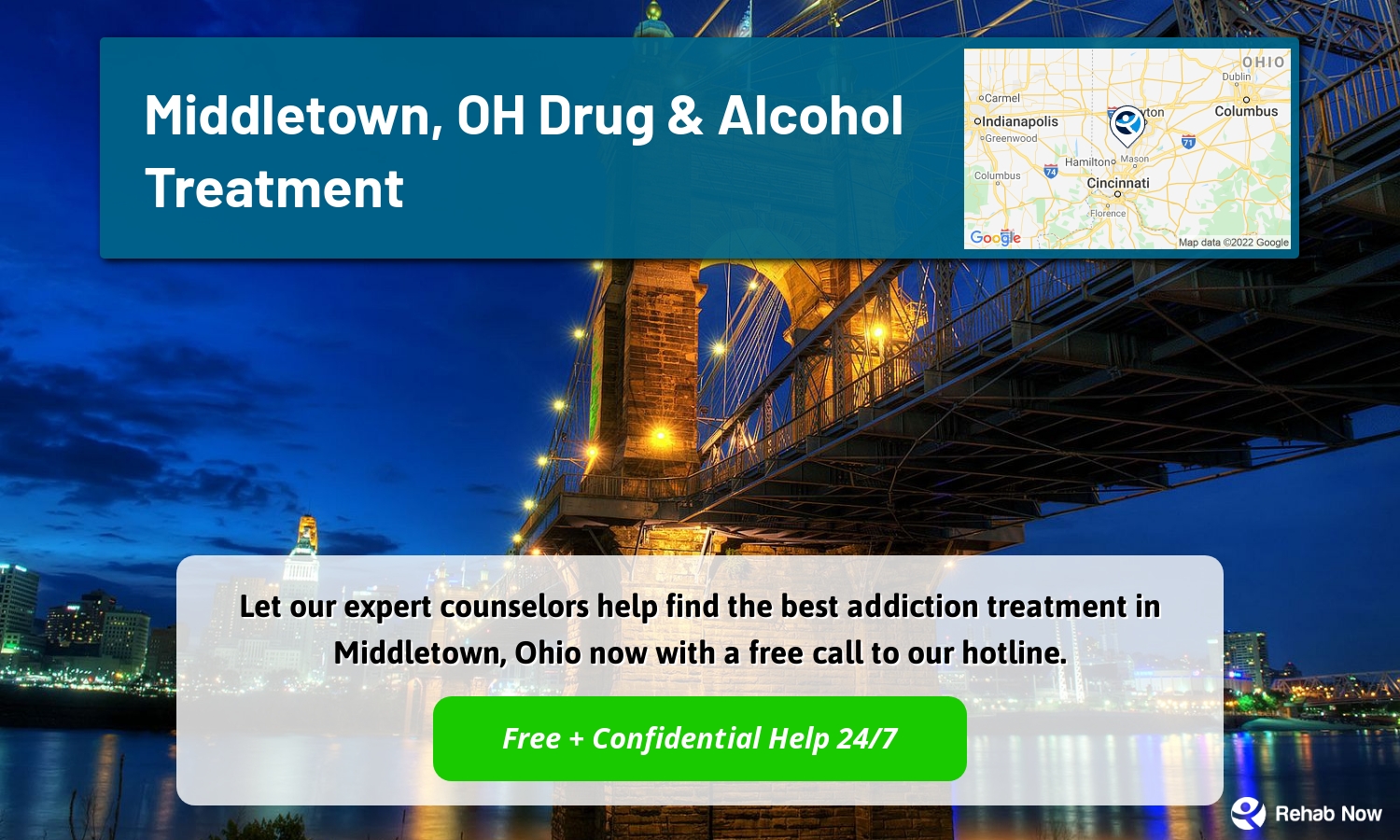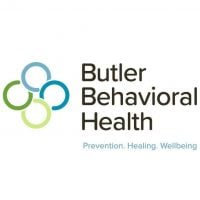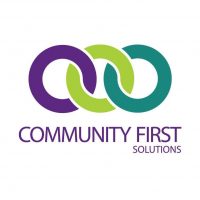Middletown, OH Drug & Alcohol Treatment
The drug addiction problem in Middletown, OH, is relatively bad. In 2010, there was a total of 376 drug-related overdose deaths in Ohio. Of these overdoses, 232 (61%) involved at least one prescription opioid. The majority of all overdose fatalities that occurred between 2000 and 2010 were accidental; only 27% were intentional suicides (the remainder were undetermined) (NAADAC).
Drug addiction and abuse have had a big impact on the community in Middletown, OH. According to recent statistics, there were over 1,000 reported cases of drug abuse in Middletown in 2016 alone. This number continues to grow every year, as does the negative impact that drug addiction and abuse have on individuals, families, and the community as a whole. Fortunately, drug abuse and addiction are treatable conditions.
We’re highlighting many of the best facilities and centers for addiction rehab here, all of them with their own special qualities. With a variety of opioid and alcohol rehabilitation services operating in Ohio, there is opportunity for treatment and a better life in Middletown.
Make The Call That Could Save Your Life.
We will help you find treatment based on your location, budget, and specific needs and help you get started safely.
Free + Confidential Consultation
Browse 14 Centers in Middletown, Ohio
Access Counseling Services - Middletown provides comprehensive, accredited, and licensed addiction treatment services tailored to each individual's needs, including aftercare and intensive outpatient care, and accepts private health insurance for those struggling with substance abuse, dual diagnosis, and other mental health and alcohol-related issues.


Access Counseling Services - Central Avenue is an addiction treatment facility located in Middletown, Ohio that offers comprehensive solutions to addiction recovery including individual and group counseling, intensive outpatient and outpatient programs, and aftercare support services.



Butler Behavioral Health Services - Hamilton Health Now
Butler Behavioral Health Services - Hamilton Health Now is an addiction treatment facility in Middletown, Ohio providing personalized care and individualized treatment plans through a combination of therapies, group therapy, and recreational activities to individuals affected by mental health issues, alcoholism, drug addiction, and substance abuse.
The Mindful Healing Center
The Mindful Healing Center in Middletown, Ohio is a reputable facility that specializes in treating substance abuse, drug addiction, mental health issues, and alcoholism through evidence-based practices, personalized treatment plans, and support from professionals and peers.
Transitional Living - Middletown in Middletown, Ohio offers comprehensive treatment services for individuals struggling with mental health issues, substance abuse, alcoholism, and drug addiction, including intensive outpatient treatment, outpatient support, and aftercare support.
Central Clinic - Middletown offers comprehensive addiction treatment and mental health services with a range of treatment methods and therapies, accredited by CARF and staffed by experienced professionals to create a supportive environment of compassion and understanding.

Positive Leaps is a comprehensive addiction and substance abuse treatment facility in Middletown, Ohio, providing tailored treatment plans, a multidisciplinary team of professionals, and various support services to guide individuals towards sustainable sobriety and improved health and well-being.
The Next Right Thing
The Next Right Thing is a drug rehab in Middletown, Ohio that offers various levels of treatment for addiction and has knowledgeable, experienced staff to provide support and guidance to those looking to get sober.
AA - Alcoholics Anonymous - Middletown
Al - Anon and Al - Ateen - Middletown
Alano Center
Concept Rehabilitation - Middletown
Concept Rehabilitation - Middletown provides personalized evidence-based treatment programs for individuals struggling with addiction, including alcoholism, dual diagnosis, opioid addiction, and other drug addiction issues, to help them achieve and maintain sobriety through therapy, residential treatment, and drug education and prevention classes.
Community Behavioral Health - South Breiel Boulevard
Community Behavioral Health - South Breiel Boulevard is an accredited mental health center in Middletown, OH that specializes in treating addictions and related issues, offering a range of care levels and therapeutic methods, financial assistance, and access to support services and resources.

Groups - Middletown
Drug and Alcohol Treatment in Middletown, OH
Middletown, Ohio, is home to a number of different drug and alcohol treatment facilities. There are various types of treatment available, including inpatient and outpatient treatment and residential and non-residential treatment.
Several different rehab centers in Middletown, Ohio, offer different treatment types. Some of the most common treatments offered include:
- Detoxification
- Inpatient rehabilitation
- Outpatient rehabilitation
- Sober living homes
- Drug education
- Dual diagnosis treatment
- Residential treatment
- Non-residential treatment

What types of treatment are available in Middletown, Ohio?
Drug treatment in Middletown, OH, can vary depending on the facility. Some facilities offer a variety of treatments, such as inpatient and outpatient treatment, while others specialize in a certain type of treatment. Treatment programs also vary in terms of length. Most programs last anywhere from 30 to 90 days, but some last up to a year or more. The most important thing, however, is the quality of treatment provided. It has to be a facility that can help you overcome your addiction and connect you with 12-step programs, such as Narcotics Anonymous or Alcoholics Anonymous aftercare services.
If you’re looking for the best drug treatment facility, you should start by asking your doctor for a referral. They will likely have a few good recommendations for you. You can also research different facilities online and read reviews from past patients. Lastly, you can contact your insurance company and ask which facilities they recommend. Often, the company will offer a discount or payment plan for services rendered.
Drug Abuse Statistics in Middletown, Ohio
According to the National Survey on Drug Use and Health, in 2016, Ohio had a drug use rate of 10.8 percent, higher than the national average of 9.4 percent. In addition, in 2015, Ohio had the seventh-highest opioid overdose death rate in the country, with 29 deaths per 100,000 people. These statistics underscore the importance of finding quality drug treatment in Middletown, Ohio.
- In Ohio, there were over 22,000 overdose deaths in 2016 alone
- It is estimated that 4.4% of the population of Ohio have a substance abuse or dependency problem
- 517,500 adults (18 and older) reported problems with illicit drugs
- In 2017, there was a 29% increase among people seeking treatment for addiction to alcohol
Additional Treatment Centers in Ohio
Ohio is suffering from a drug abuse problem that is costing thousands of its residents their lives every single year. Opioids, particularly Fentanyl and heroin, are the leading drugs in the state. The state ranks in the top 10 for illicit use of painkillers. Opioid-related overdose rates in Ohio are by far some of the highest in the country.
Still haven't found the right recovery center? Browse nearby Ohio cities.
- Holland, OH (150.2 mi.)
- Loveland, OH (18.1 mi.)
- Union, OH (27.0 mi.)
- Akron, OH (186.2 mi.)
- Steubenville, OH (207.7 mi.)
- Willoughby, OH (214.9 mi.)
- Mason, OH (11.3 mi.)
- Vandalia, OH (28.0 mi.)
- Albany, OH (118.5 mi.)
- West Liberty, OH (61.2 mi.)
- Beach City, OH (168.2 mi.)
- Mansfield, OH (131.2 mi.)
- Cleveland, OH (134)
- Columbus, OH (129)
- Cincinnati, OH (107)
- Dayton, OH (57)
- Toledo, OH (48)
- Akron, OH (43)
- Youngstown, OH (42)
- Canton, OH (36)
How to Find The Best Drug Rehab in Middletown, Ohio
When looking for drug rehab in Middletown, Ohio, it is important to consider the best treatment suited for the individual’s needs. Some of the most common types of treatment include inpatient treatment, outpatient treatment, and residential treatment.
Inpatient treatment is offered in a rehab center and requires that the individual stay at the facility for the duration of the treatment program. Outpatient treatment is also offered in a rehab center, but the individual does not live at the facility. Rather, they attend rehab sessions during the day and return home in the evening. Residential treatment is offered in a residential setting, such as a therapeutic community or halfway house. Non-residential treatment is also available and delivered in various settings, including inpatient and outpatient facilities.
In addition to considering the type of rehabilitation best suited for their needs, it is also important to consider whether they need co-occurring treatment. An individual might have a drug addiction and a mental health disorder in some cases. In these instances, they will need to receive treatment for drug addiction and mental health disorders to recover fully.
Factors to Consider When Choosing a Drug Rehab in Middletown, Ohio
Many factors should be considered when choosing a drug rehab in Middletown, Ohio. Some of the most important factors include the type of treatment offered, the cost of treatment, and the facility’s location.
It is important to choose a drug rehab that offers the treatment best suited for the individual’s needs. Some of the most common types of treatment include inpatient treatment, outpatient treatment, and residential treatment. In addition, it is important to choose a rehab center that offers co-occurring treatment if the individual has a drug addiction and a mental health disorder.
It is also important to consider the cost of treatment. Some rehab centers charge more than others, and some insurance companies may cover some or all of the treatment costs. Finally, choosing a rehab center in a safe and convenient area is important. It is often beneficial for family members to attend support group meetings with the individual in treatment, which can be helpful if these meetings are offered nearby.
What are the benefits of rehab facilities?
There are a number of benefits to rehab facilities:
- Rehab centers offer various treatment options so that individuals can choose the type of treatment best suited for their needs.
- Rehab centers offer a safe and supportive environment where individuals can focus on recovery.
- Rehab centers provide access to a number of different resources, including therapy, medication management, and peer support.
- Rehab centers offer various aftercare services to help individuals maintain their sobriety after completing treatment.
How long do rehab facilities take to complete?
The length of time that an individual will need to stay at a rehab center will depend on their needs. Some individuals can complete treatment in as little as 30 days, but others may need to stay for longer periods. It is important to choose a rehab facility that offers the treatment and supportive services needed.
What should you expect from your doctor after rehabilitation?
Most people who complete rehabilitation should expect to continue seeing their doctor regularly. This is because their doctor will monitor their progress and help them maintain their sobriety. In addition, doctors can provide prescription medications that can help individuals during the early stages of recovery. Finally, doctors can offer support and advice to those struggling with addiction.
What happens after rehab?
After completing a rehabilitation program, individuals should regularly see their doctor. This is because their doctor will monitor their progress and help them maintain their sobriety. In addition, doctors can provide prescription medications that can help individuals during the early stages of recovery. Finally, doctors can offer support and advice to those struggling with addiction.
What should you expect from your doctor after rehabilitation?
Most people who complete rehabilitation should expect to continue seeing their doctor regularly. This is because their doctor will monitor their progress and help them maintain their sobriety. In addition, doctors can provide prescription medications that can help individuals during the early stages of recovery. Finally, doctors can offer support and advice to those struggling with addiction.
Let our expert counselors help find the best addiction treatment in Middletown, Ohio now with a free call to our hotline. (888) 674-0062.










